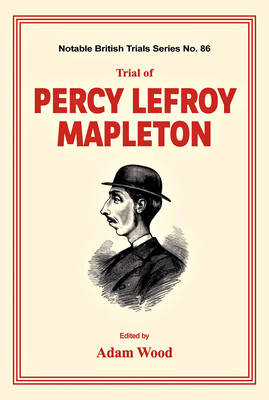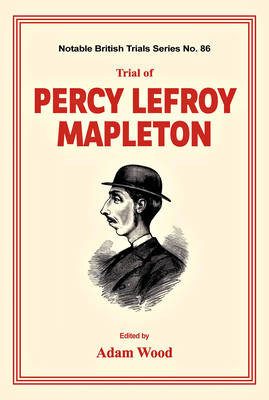
- Retrait gratuit dans votre magasin Club
- 7.000.000 titres dans notre catalogue
- Payer en toute sécurité
- Toujours un magasin près de chez vous
- Retrait gratuit dans votre magasin Club
- 7.000.0000 titres dans notre catalogue
- Payer en toute sécurité
- Toujours un magasin près de chez vous
Description
At 3.20pm on the hot afternoon of 27th June 1881, the London Bridge to Brighton train pulled into Preston Park, a mile from its final destination. As the ticket collectors approached the carriages, one saw a thin, sickly looking man sitting in a first-class compartment beckoning him over. As the official arrived at the window, he saw that the passenger's face and neck were smeared with blood, and there was a clot beside an ear. There was blood between his fingers, blood upon his clothes, blood in the carriage and blood upon the train's footboard, which also bore the marks of bloodstained fingerprints. The carriage was otherwise empty.
A terrible tale was told of being attacked and shot at by two other passengers, who had now disappeared, before falling into unconsciousness until arriving at Preston Park.
As the passenger stepped onto the platform, it was noticed that a small chain was hanging out of his left shoe. One of the collectors stooped to pull on it, and a gold, white-faced watch emerged. The passenger had, he said, put it there for safekeeping. He was taken to Brighton for treatment, on the journey giving his name as Arthur Lefroy, of 4, Cathcart Road, Wallington, Surrey.
So began the extraordinary story of Percy Lefroy Mapleton. During his return journey to south London accompanied by two railway police officers, a body was found by workers on the tracks in Balcombe Tunnel, 18 miles before Preston Park. Was this one of Lefroy's attackers, or was there something more sinister behind the discovery? The answer seemed to be given later that day when Lefroy absconded from his home and disappeared into thin air for eleven days.
During this period, an inquest presided over by Coroner Wynne Baxter heard evidence from Scotland Yard's Divisional Surgeon Dr Thomas Bond and concluded that the man found in Balcombe Tunnel had indeed been murdered by Lefroy, and a warrant for his arrest was issued.
A sketch of the wanted man was provided by someone who knew him; this, in turn, was developed into a wanted poster. When the likeness appeared in The Daily Telegraph of 1st July, it made history as the first time an image of a wanted person appeared in a national newspaper. As a result, with other newspapers subsequently publishing their own sketches of an increasingly-evil looking Lefroy, the public became hugely interested and false sightings of the fugitive were reported the length and breadth of the county. By the time he was finally arrested by Inspector Donald Swanson a week later, Lefroy was, in the public's eyes, already guilty, having been subjected to trial by the media.
But was Lefroy telling the truth? He resolutely stuck to his story of being attacked by one or more fellow passengers, even when his solicitor suggested that the criminal psychiatrist Dr Forbes Winslow examine him in an attempt to prove insanity. There were no witnesses to any assault on the dead man, Mr Frederick Isaac Gold, and some witnesses stated that the train did indeed slow down just enough for potential attackers to jump off, as Lefroy had suggested.
The jury at his trial had no such doubts, however, and after just ten minutes' deliberation found him Guilty. Dramatically, following the Judge's pronouncement of the death penalty Lefroy turned to the jury box and said: "Gentlemen of the Jury: Some day, when too late, you will learn that you have murdered me."
In TRIAL OF PERCY LEFROY MAPLETON, No. 86 in the official Notable British Trials series, Adam Wood examines the reality of the events of 27th June 1881 and compares the polar-opposite lives of Lefroy and Frederick Gold, and considers the impact of The Daily Telegraph's decision to publish the likeness of a man who was, at that point, still far from being proved guilty.
This book reproduces the testimony given at the trial, together with an introduction, a chronology and appendices.
Spécifications
Parties prenantes
- Auteur(s) :
- Editeur:
Contenu
- Nombre de pages :
- 378
- Langue:
- Anglais
Caractéristiques
- EAN:
- 9781911273608
- Date de parution :
- 30-04-19
- Format:
- Livre broché
- Format numérique:
- Trade paperback (VS)
- Dimensions :
- 152 mm x 229 mm
- Poids :
- 526 g

Les avis
Nous publions uniquement les avis qui respectent les conditions requises. Consultez nos conditions pour les avis.






